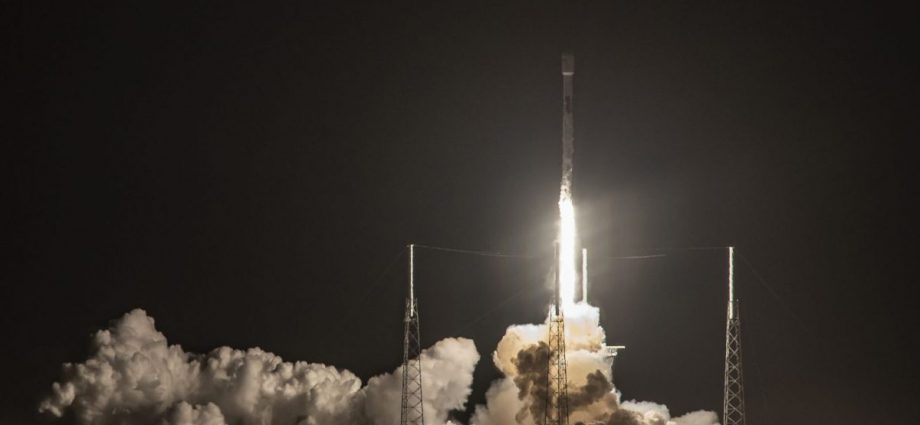
More than 440,000 kilometers from Earth, a signal was recently sent from a precious cargo just a few days into its journey to the moon. The communication received by scientists at mission control at the Mohammed bin Rashid Space Center in Dubai confirmed that everything was on track and that the systems of the small four-wheeled rover were functioning properly.
At some point in April, the Japanese lander craft that is carrying the UAE-built rover will land in the Atlas crater on the moon’s surface.
When the rover, named Rashid, sent its first communication after reaching lunar orbit on board the Hakuto-R lander, it was a moment of pride in the latest scientific achievement by the United Arab Emirates’ space program. But it was not just about a technological milestone, it was also an achievement for policymaking, both domestic and foreign, in an era of space exploration being driven by smaller nations.
Historically, space exploration was dominated by the US and the Soviet Union and became an extension of the Cold War as the two superpowers raced to outdo each other. As relations improved, cooperation on the International Space Station (ISS) project marked one of the strongest symbols of more peaceful ties between the two sides.
Even now, as relations between the US and Russia have deteriorated again, the ISS remains one of the few remaining areas of collaboration.
Now, cooperation in space is much broader and involves more nations and private entities. Take the UAE’s lunar rover, for example.
The vehicle was designed and built in the Emirates and is being carried by a lander built by the Japanese company ispace. That in turn was launched by a SpaceX Falcon 9 rocket on December 11 from the US state of Florida. The UAE’s Hope mission, which reached Mars a year ago, was similarly collaborative.
Though scientific collaboration between the UAE and the classic space superpowers like Russia and China continues, the real collaboration is happening between the UAE and South Korea and Japan, a collaboration that is based in their understanding that without real knowledge transfer this can’t be a long term relationship.
The same thing happened with China during the Covid-19 pandemic, where the partnership in developing testing capability as well as testing and producing a vaccine was developed with China, not any of the traditional allies like the US, the UK or Europe.
Scientific collaboration, including in space, now reflects the new role of middle powers as they align not just to collaborate on technology but on global issues. The cooperation of countries like the UAE, South Korea, Japan and India is painting a new picture of how middle powers are finding new weight and assuming new responsibilities.
This will not stay in space or even just in science and technology but will spread through other areas of relations and diplomacy. This cooperation could be the hallmark of a new world order that is non-polar in nature and built around addressing national interest and global challenges alike.
In a workshop in Abu Dhabi on the future of a blue economy, the UAE’s recently appointed assistant minister of foreign affairs for advance science and technology, Omran Sharaf, pointed out that the UAE mission to the moon was 10 times as complicated as the mission to Mars, but that the planned mission to the asteroid belt will be another 10 times as difficult as the Rashid rover mission.
As much as this is a testament to the fact that the UAE is not looking for a trophy achievement, it is seeing space as an area for deep and forward-looking collaboration with partners including, but not only, the traditional space heavyweights of the US and Russia. The appointment of an assistant minister for advanced science and technology highlights the fact that this is a major area of diplomatic cooperation as the UAE sees it.
Navigating space, be it the moon, Mars or the asteroid belt, has domestic as well as foreign policy implications. The UAE’s space program feeds into other progressive technologies such as artificial intelligence, robotics and biotechnology. It has become a cornerstone of the UAE’s economic diversification strategy towards a knowledge economy.
This required the UAE to undergo a complete overhaul of its educational systems, develop new research and development funds, and create new science-oriented governance structures, including ministerial positions and government bodies.
The Rashid rover may be a pathfinder to the moon, but in the UAE it has already found new pathways for cooperation that were not previously conceived. Partnership based on knowledge transfer and common areas of research has brought together geographically diverse countries like the UAE and Japan, and is bringing traditional foes like the UAE and Israel together.
The basis of such cooperation and new alliances is not ideology nor geopolitical rivalry; it’s a shared understanding of the common threats facing the whole of humanity.
Be it in space or deep blue waters, middle-power cooperation will be the basis of the new world order.
This article was provided by Syndication Bureau, which holds copyright.

